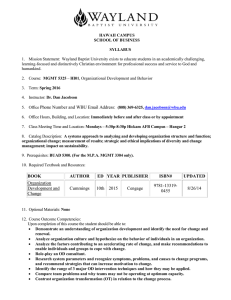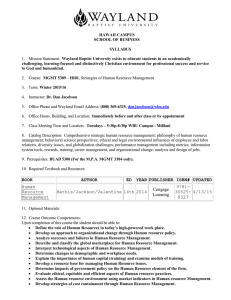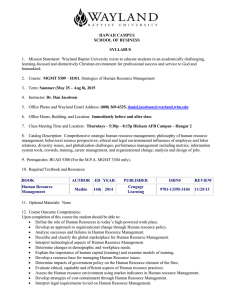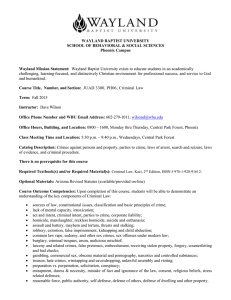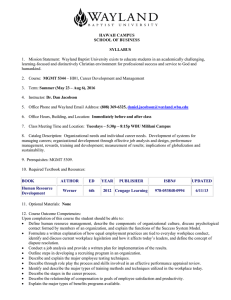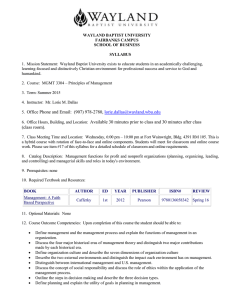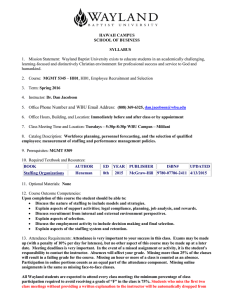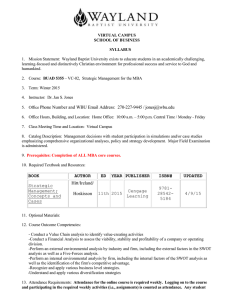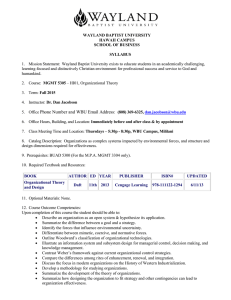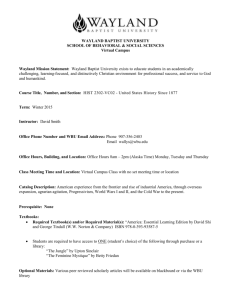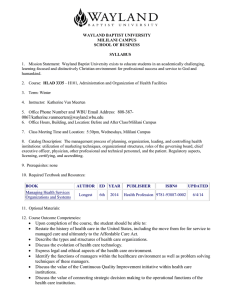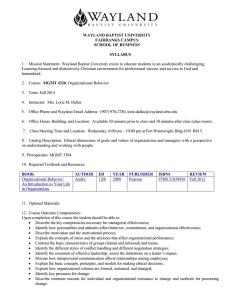Document 10387281
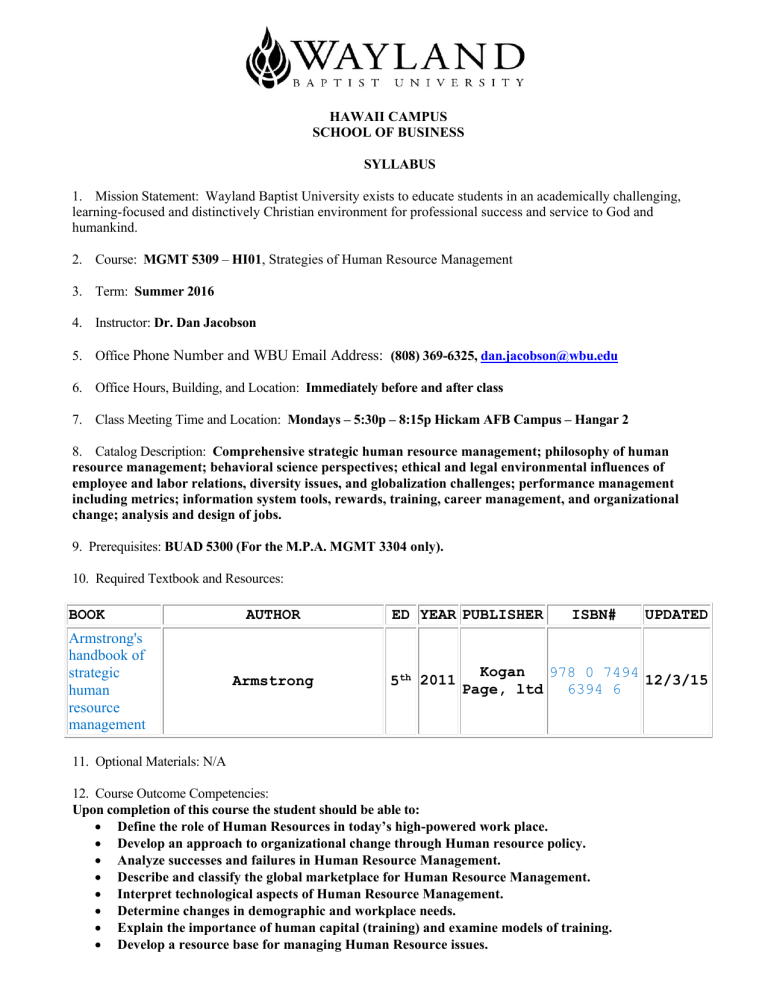
HAWAII CAMPUS
SCHOOL OF BUSINESS
SYLLABUS
1. Mission Statement: Wayland Baptist University exists to educate students in an academically challenging, learning-focused and distinctively Christian environment for professional success and service to God and humankind.
2. Course: MGMT 5309 – HI01 , Strategies of Human Resource Management
3. Term: Summer 2016
4. Instructor: Dr. Dan Jacobson
5. Office Phone Number and WBU Email Address: (808) 369-6325, dan.jacobson@wbu.edu
6. Office Hours, Building, and Location: Immediately before and after class
7. Class Meeting Time and Location: Mondays – 5:30p – 8:15p Hickam AFB Campus – Hangar 2
8. Catalog Description: Comprehensive strategic human resource management; philosophy of human resource management; behavioral science perspectives; ethical and legal environmental influences of employee and labor relations, diversity issues, and globalization challenges; performance management including metrics; information system tools, rewards, training, career management, and organizational change; analysis and design of jobs.
9. Prerequisites: BUAD 5300 (For the M.P.A. MGMT 3304 only).
10. Required Textbook and Resources:
BOOK AUTHOR ED YEAR PUBLISHER ISBN# UPDATED
Armstrong's handbook of strategic human resource management
Armstrong 5 th 2011
Kogan
Page, ltd
978 0 7494
12/3/15
6394 6
11. Optional Materials: N/A
12. Course Outcome Competencies:
Upon completion of this course the student should be able to:
Define the role of Human Resources in today’s high-powered work place.
Develop an approach to organizational change through Human resource policy.
Analyze successes and failures in Human Resource Management.
Describe and classify the global marketplace for Human Resource Management.
Interpret technological aspects of Human Resource Management.
Determine changes in demographic and workplace needs.
Explain the importance of human capital (training) and examine models of training.
Develop a resource base for managing Human Resource issues.
Determine impacts of government policy on the Human Resource element of the firm.
Evaluate ethical, equitable and efficient aspects of Human resource practices.
Assess the Human resource environment using market indicators in Human resource Management.
Develop strategies of cost containment through Human Resource Management.
Interpret legal requirements levied on Human Resource Management.
Develop Human Resource policy for a firm.
Prepare for the Professional Human Resource Certification Examination.
13. Attendance Requirements: Attendance is very important to your success in this class. Exams may be made up (with a penalty of 10% per day for lateness), but no other aspect of this course may be made up at a later date. Meeting deadlines is very important. In the event of a missed assignment or activity, it is the student’s responsibility to contact the instructor. Absences will affect your grade. Missing more than 25% of the classes will result in a failing grade for the course. Missing an hour or more of a class is counted as an absence.
Participation in online portions counts as an equal part of the attendance component. Missing online assignments is the same as missing face-to-face classes.
All Wayland students are expected to attend every class meeting; the minimum percentage of class participation required to avoid receiving a grade of “F” in the class is 75%. Students who miss the first two class meetings without providing a written explanation to the instructor will be automatically dropped from the roster as a “no-show.” Students who know in advance that they will be absent the first two class meetings and who wish to remain in the class must inform the instructor in order to discuss possible arrangements for making up absences.
14. Statement on Plagiarism and Academic Dishonesty: Wayland Baptist University observes a zero tolerance policy regarding academic dishonesty. Per university policy as described in the academic catalog, all cases of academic dishonesty will be reported and second offenses will result in suspension from the university.
15. Disability Statement: “In compliance with the Americans with Disabilities Act of 1990 (ADA), it is the policy of Wayland Baptist University that no otherwise qualified person with a disability be excluded from participation in, be denied the benefits of, or be subject to discrimination under any educational program or activity in the university. The Coordinator of Counseling Services serves as the coordinator of students with a disability and should be contacted concerning accommodation requests at (806) 291- 3765.
Documentation of a disability must accompany any request for accommodations.”
16. Course Requirements and Grading Criteria:
Students shall have protection through orderly procedures against prejudices or capricious academic evaluation. A student who believes that he or she has not been held to realistic academic standards, just evaluation procedures, or appropriate grading, may appeal the final grade given in the course by using the student grade appeal process described in the Academic Catalog. Appeals may not be made for advanced placement examinations or course bypass examinations. Appeals are limited to the final course grade, which may be upheld, raised, or lowered at any stage of the appeal process. Any recommendation to lower a course grade must be submitted through the Executive Vice
President/Provost to the Faculty Assembly Grade Appeals Committee for review and approval. The
Faculty Assembly Grade Appeals Committee may instruct that the course grade be upheld, raised, or lowered to a more proper evaluation.
17. Tentative Schedule: (Calendar, Topics, Assignments) review )
June 6
Present article on HRM (any topic)
Homework for next time:
Homework – Article Summary (HR Strategy – no presentation, just submit)
Blackboard Discussion (homework still due June 6 th )
*** ONLINE MEETING ONLY ***
Chapters 5-7
Homework for next time:
Blackboard
June 13 Chapters 8-10
Present article on HRM (OD, Human Capital, or KM Strategy)
Homework for next time:
June 20 Chapters 11-13
Present article on HRM (Organizational Performance)
Homework for next time:
June 27 Chapters 14-16
Present article on HRM (Workforce Planning)
Homework for next time:
July 4
July 11
*** HOLIDAY—NO CLASS ***
Chapters 17-19
Present article on HRM (Compensation or Benefits)
Final Collaboration
July 18 Chapters 20-21
Discuss paper presentation criteria
Submit to
July 25 Discuss Safe Assignment Reports
Paper Presentations
Discuss criteria
Complete final paper
August 1 Paper Presentations (if necessary)
Final Exam and Final Paper due online
Professor reserves the right to alter this schedule as needed.
Please be sure to ask if you have questions or concerns during this course. Remember that, while you are a student, you are also teaching the class that which your education and experiences have taught you.
18. Additional information as desired by the faculty member.
Class Participation: Class participation is a very important part of education. This class requires active class participation. Many classes begin with a basic question that appears clear-cut, and the class participation is what helps add to the complexity that is critical for solving problems and understanding processes. Students are strongly encouraged to participate in class.
Other Important Information:
1.
Homework is due by the beginning of each class.
2.
Late homework will result in a lower grade.
3.
Written work is graded on the basis of content first, but also on the quality of grammar and punctuation.
4.
All written assignments should be 12-point type, double-spaced, and using APA Manuscript Writing
Style.
5.
Questions concerning grades received should be resolved within one week after the assignment has been returned.
6.
Unless noted as a group assignment, all work should be original work of the individual student.
7.
Academic honesty is expected of all students. Plagiarism, cheating, and other acts that lack academic honesty may result in a zero on the particular assignment.
8.
Students will need to use the Internet to access some assignments.
9.
Cell phones and pagers must be placed on vibrate or silent mode.
10.
Presentations of papers must be done on the assigned date with the class to receive credit.
11.
Exams may be made up, but there is a 10% penalty for each day it is late.
12.
Always contact the professor if you need assistance.
Article Presentations: In order to better understand and participate in the stages of the study of the assigned material, students will be required to bring examples of relevant topics to class. The format for the articles will be described in class, and when presented they will be graded based upon quality and relevance to the topic being discussed. They may also be graded based upon the amount of class discussion that ensues when the summary is presented. Length of the individual presentations will be discussed when each assignment is made.
Term Paper: Students will complete one research paper for this class. The paper should be a minimum of ten pages of content, excluding coversheet, abstract and references, and should utilize at least ten references, five of them scholarly (journal articles, not just websites). Students will orally present a summary of this paper to the class. Papers must utilize APA format. Topics for papers must also be preapproved by the professor. To avoid a 10% deduction, paper draft must be available by the ninth class meeting to submit online to Safe Assignment. If Safe Assignment detects more than a 20% match of previously written work, you must discuss with the instructor to get further instructions.
STATEMENTS:
Course Format: This course will be taught in a blended format, with the majority (over 51%) of the contact hours occurring in class. There will also be Blackboard assignments and other activities outside the classroom.
“This class will adhere to zero tolerance for using someone else’s work as your own.”
“Students are responsible for reading, understanding, obeying, and respecting all academic policies, with added emphasis being placed upon academic progress policies, appearing in the Wayland Baptist
University Academic Catalog applicable to their curriculum and/or program of study.”
